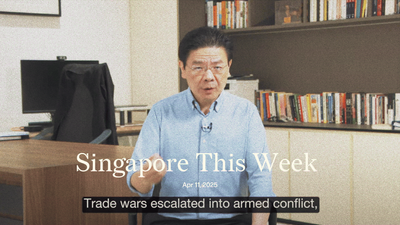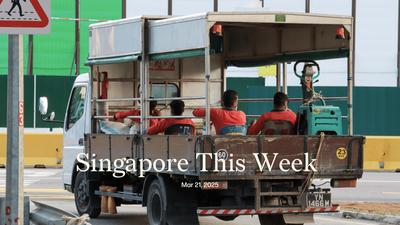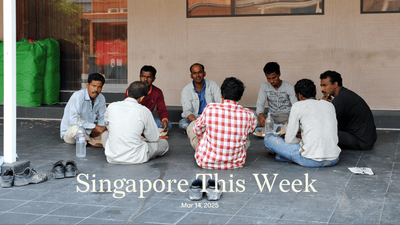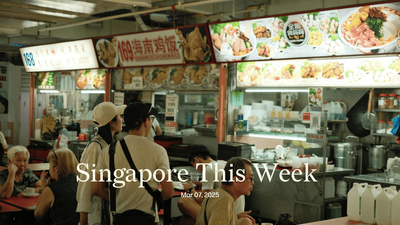Politics: He Ting Ru and Sylvia Lim do the most for gay men
On Tuesday, Singapore repealed S377A, the colonial-era law that criminalises sex between men. Celebrations shouldn’t blind us to problematic political motivations and machinations. Lee Hsien Loong, the prime minister, had announced in August that the ruling People’s Action Party (PAP) intended to repeal it mostly because the courts might soon rule it unconstitutional. The repeal was always less about equality than opportunism. The PAP claims that judicial decisions on socially divisive issues can fuel tensions, though there’s no evidence of this in post-independence Singapore. Parliamentary speeches, ranging from homophobia to allyship, showed that politicians here are quite adept at cleaving society apart even as they purport to be progressive. The PAP also amended the Constitution to give Parliament the power to define marriage. This is to stave off constitutional challenges by gay rights activists, as happened with S377A. In doing so the PAP robs the judiciary of its mandate to interpret the Constitution on a matter of basic human rights. While gay men cheer, all queer couples, concerned about adoption, housing and healthcare, should worry. The carve out also sets a dangerous precedent. “...what would stop a future Parliament from passing discriminatory legislation and then shielding it from judicial oversight?” asked He Ting Ru of the Workers’ Party (WP). Power is again shifting from judges to politicians. Sylvia Lim, fellow WP member of parliament (MP), was the only other one who abstained from the amendment vote, a position Jom has supported. Finally, the WP lifted its party Whip while the PAP kept its in place. This meant that the former’s MPs spoke more freely on the issue. Was that a good thing? Jom will examine this in a future editorial.
Society: If an otter can do it, so can you
More animals at the Night Safari have been placed under the spotlight, as the Creatures of the Night Show reopened with three new species in its repertoire. In the upsized 1,000-seat amphitheatre, audiences were introduced to the Indian crested porcupine, raccoon dog and bearded pig, alongside regulars like the fennec fox and Asian small-clawed otter. Creatures of the Night has been an integral part of the Night Safari’s animal presentations for almost two decades: “We connect people with wildlife to create emotional bonds,” said a Mandai Wildlife Group spokesperson in response to Jom’s query about the ethics of animal shows. This gives the Night Safari “opportunities to advocate for the protection of wildlife and their habitats and grow an appreciation for nature amongst our guests.” Mandai said it highlights “the natural behaviours of animals,” which are “trained using positive reinforcement” to ensure “that all their behaviours are voluntary.” (Though one wonders how “natural” it is for otters to place plastic bottles into recycling bins.) While there is widespread condemnation by activists of animal circuses, opinion of other, less harmful shows is mixed. ACRES, a local animal welfare NGO, has for years been pressuring and working with Mandai, and its predecessor, Wildlife Reserves Singapore, to improve them. Defenders of zoos argue that they play a critical role in animal conservation and public education, more so in urbanised areas where people have no means of easily observing animals. Without Mandai’s parks, only Singaporeans of means would ever enjoy broad wildlife encounters. Exposure breeds empathy, so it goes. Still, whatever the merits of Singapore’s “good” zoo—animal welfare far higher than in many others—we should think of the zoo, conceptually, as a pitstop on our journey towards a more harmonious balance with the world’s wildlife.
Society: Fallen heroes
Workplaces can be fatal, especially if you’re a low-wage employee in the transport, marine, construction and manufacturing industries, or, if your job takes you to precarious heights, literally. Two workers died in the past week—one window cleaner fell to his death, another drowned after falling into the sea while carrying out scaffolding works. The past year has seen a spate of workplace fatalities, leading the manpower ministry to impose a heightened safety period that ends on February 28th 2023. Until then, companies who are found to have breached workplace safety and health regulations (resulting in a serious or deadly accident) won’t be able to hire new foreign workers for up to three months. Businesses driven by tight budgets and tighter deadlines often cut costs and corners, invariably compromising safety. The rush to finish jobs delayed by Covid lockdowns surely accentuated the risks to workers. There might be fewer deaths and major injuries in the third quarter of this year, but the death toll in 2022 is still the highest in four years at 42. With another month to go before the year ends, perhaps harsher penalties are urgently needed to ensure no one else has to miss ringing in 2023 with their friends and loved ones. Each life lost is one too many.
Arts: Body and Spirit
The Asian Civilisations Museum’s latest special exhibition is all about the wholeness and wellness of body, spirit and mind. “Body & Spirit” is a display of sacred and ritual art from Singapore and features over 100 objects drawn from the National Collection as well as from private collectors and the local community. Visitors to the exhibition will have the chance to personally experience Asian wellness practices like mandala drawing and yoga in the “Mindfulness Lab” interactive space. Also complementing the main exhibition are two special showcases, “Vel Vel: The Burden Dance” and “Buddha Relics”. Visitors can learn more about the kavadi used by devotees during Thaipusam in “Vel Vel” and view bone relics from India’s Piprahwa Stupa. The exhibition is open now and runs until March 26th 2023.
Internet culture: MP scorecards
The parliamentary debates on S377A might have concluded but the conversation continues on social media. Instagram page @heckin.unicorn, a queer-owned business from Singapore, has created summaries of the debate’s highlights with a focus on individual MP’s positions. Attention in the comments has focused mostly on WP MPs, particularly Gerald Giam and Dennis Tan, for their refusal to support the repeal. Given that many voters have rallied behind the WP for their progressive socio-economic ideals and policy proposals, this reluctance to uniformly stand behind queer Singaporeans has come as a disappointment. On Twitter, users were live-tweeting the debates, one of the benefits of the ministry of communications and information allowing live streams of Parliament, earlier this year. Twitter users have choice words for the apology by Vivian Balakrishnan, foreign minister, to his “gay friends” for “falling short”. This apology has read thinly considering how Balakrishnan publicly outed his political opponent Vijay Wijeysingha during the 2011 election. The internet never forgets.
History weekly by Faris Joraimi
Among the curious speeches given at Tuesday’s parliamentary debate was the one by Christopher de Souza, PAP MP for Holland-Bukit Timah. He expressed his objection to repealing S377A and support for the constitutional amendment to prevent the redefinition of marriage by legal challenges. Opening his speech with a 1962 quote by Lee Kuan Yew on the importance of order before law, de Souza invoked the notion of “the natural order of things”. It’s a phrase found in S377A itself, where gay sex is described as being “against the order of nature”. Historically, many kinds of marriages were also considered unnatural, including interracial ones, also known by the pejorative term “miscegenation”. Bans on Whites marrying other races were only lifted in 1967 in the United States and 1985 in South Africa. There’s been a long history of discrimination against descendants of mixed marriages in colonial societies, including the “mulatto” (African-European) and “mestizo” (European-Indigenous) in the Hispanic world. The British and Dutch stigmatised mixed-race unions in South-east Asia, due to European fears about the White race being weakened if they married “inferior” races. Such degeneration and decay would threaten the White prestige on which colonial power depended. Eurasians faced discrimination in British Malaya and the Dutch East Indies (where they were called “Indo”). They were employed in positions lower than full-blooded Europeans and disparagingly called “half-castes”. Most people are no longer opposed to interracial couples on such grounds today, unless you’re Tan Boon Lee. But it goes to show that there is no such thing as a “natural” order; marriage is a product of social, cultural and legal definitions that change over time. Many Eurasians around Asia—maybe even some de Souzas—would know this.
Tech: Go Comfortably
ComfortDelGro, Singapore’s largest taxi operator, and Gojek, a ride-hailing giant, entered into a strategic partnership to address key issues affecting Singapore’s transport industry, including driver shortage. The two-year deal will enable access to ComfortDelGro's 9,000 odd taxis via the Gojek app. Other areas of potential collaboration include electric vehicles, insurance, driver training, and vehicle maintenance assistance for driver-partners. After Singapore lifted pandemic restrictions, private-hire and taxi companies have been scrambling to recruit more drivers to meet surging passenger demand. ComfortDelGro and Gojek will announce more information about the deal in the coming months. So next time you book a Gojek ride, you might wait less and have a ComfortDelGro cab roll up to your front door. One wonders, however, if Gojek’s relatively low prices will increase, bringing their drivers in line with ComfortDelGro’s. Even if so, it’s only fair that they earn decent salaries.
Tech: GIC and Temasek are tangled in the FTX web
The unfolding FTX debacle clearly made Temasek look bad, but GIC, its sister sovereign wealth fund, is not completely safe either. GIC is an investor in Digital Currency Group (DCG), a venture capital firm that has ties to Genesis Trading, a troubled cryptocurrency broker. GIC has stated that it anticipates high volatility in this investment in the short term. Last November, DCG raised US$700m (S$963m) from investors such as Softbank, Alphabet’s CapitalG, Ribbit Capital and GIC. Genesis was reported to be struggling to raise new funding for its lending unit in order to deal with a liquidity crunch caused by the collapse of FTX, a crypto exchange. Genesis is looking for at least US$1bn (S$1.36bn) in new capital and has warned potential investors that if it does not receive fresh funding, it may have to file for bankruptcy. In a November 29th update to its original November 17th statement, Temasek revealed the rationale behind its FTX investment: to back a leading digital asset exchange that would provide market-neutral exposure to crypto markets and rely only on a fee income model with no trading or balance sheet risk. They clarified that they invested in market infrastructure rather than seeking direct exposure to cryptocurrencies. Even then, extensive reviews of audited financial statements, multiple rounds of due diligence, and inquiries about the relationship between FTX and Alameda Research, a hedge fund run by FTX’s boss, could not protect Temasek. In the statement, Temasek said, “Because due diligence is conducted from an outside-in perspective and access to information is limited, there is the risk that a well-concealed fraud by a small group of people, as reports on FTX suggest, can go on undetected.” While the world reels from the immediate blow-up of FTX, a larger crisis may be brewing as a result of the contagion effects across the crypto industry.
If you enjoy Jom’s work, do get a paid subscription today to support independent journalism in Singapore.







